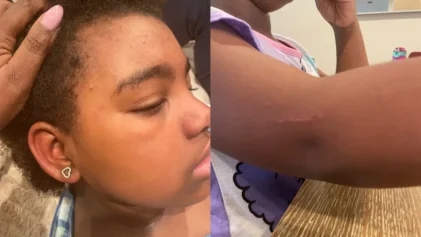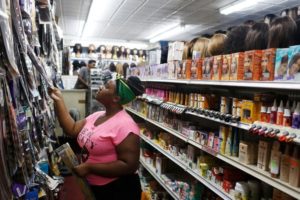
Takeya Daniels shops at Neoh Beauty Supply in Brooklyn. Photo by Kirsten Luce/The News York Times
Organic Root Stimulator. Dark & Lovely. Creme of Nature. KeraCare.
These are just some of the popular Black hair care brands that line the shelves of your local beauty supply store. They each have one major factor in common, however — they’re not Black-owned. And the same goes for the overwhelming majority of beauty supply stores that carry them.
It’s no secret that African-Americans are the No. 1 consumers of ethnic hair care and beauty products, yet they own less than 1 percent of the total market share in the nearly $700 million Black hair industry. Why is that?
The answer to this question lies in the history of the Black hair care market. According to Ebony, the Korean government banned the export of raw hair in 1965, making it virtually impossible for American business owners to produce wigs made from flowing Korean tresses.
The U.S. government later banned the import of wigs with any trace of Chinese hair, making it that much easier for the Koreans to exploit the sale, supply and distribution of wigs, weaves and extensions. The Asian nation also has its thumbprint on several hair care brands marketed specifically to African-Americans.
As discussed in Aaron Ranen’s 2006 documentary titled Black Hair, it’s estimated that Koreans own roughly 60 percent of the Black hair care industry market share. That number has likely increased over the last 10 years.
So then the new question becomes, how do African-Americans take control of the Black hair industry? Many Black hair industry experts admit it’s a tough question to answer, but one that definitely needs to be addressed.
“Some of the steps we can take [to regain control of the hair care industry] is continue to make ourselves visible and make it known to our community that we are the owners of the product,” DeShawn Bullard, founder and CEO of NouriTress Perfect Hair Products told Atlanta Black Star. “And to get these women to participate and join up this fight in taking back the industry.
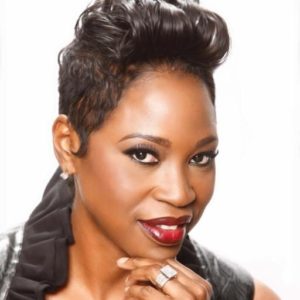
DeShawn Bullard, founder and CEO of NouriTress Perfect Hair Products.
Bullard’s NouriTress line was founded on the principle of keeping tresses nourished to prevent hair loss. The seasoned hair stylist and entrepreneur said she developed her product line after a number of women came into her salon with severe hair breakage and shedding due to the wear and tear of weaves and wigs. The growing issue, experienced by a myriad of Black women, ultimately led her to manufacture a hair growth vitamin packed with saw palmetto, green tea, vitamin D3 and cayenne pepper, among other ingredients. From there, the NouriTress hair care line blossomed.
“I think what makes our products unique is we’re the only company in the multi-cultural space that’s focusing on hair restoration,” Bullard said. “Our whole formulation for what we have … is for anchoring your hair at the root, strengthening the hair and creating new hair growth from a clinically proven standpoint.”
Bullard takes pride in running a Black-owned business, but admitted that it sometimes leads consumers to prejudge her products and automatically give them a substandard rating. She even confessed to removing her face from her company website years ago for this same reason. Now, Bullard says she feels that times have changed, and that people are glad to know her businesses is Black-owned.
For Natalya’s Beauty Supply store owner Rena Green, the next step in taking control of the Black hair industry lies in the hands of the consumers. Green, who opened her business in 2007 after finding that there weren’t many beauty supply stores in Conyers, Georgia, asserted that encouraging Black customers to patronize other Black businesses is a start to African-Americans getting their foot in the hair industry’s door.
“What I try to do each day is teach one [individual] and let them know, ‘Hey, patronize your Black-owned stores,’ ” Green said. “We can do things. We can help each other. We need to build up our own communities and we need to patronize our own people.”
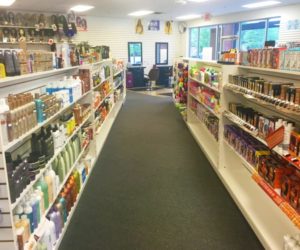
Natalya’s Beauty Supply located in Conyers, Georgia.
The beauty supply owner admitted that she didn’t know much about business before she opened her store, which offers in-store braiding, lashes, quick weaves and sew-ins. Green also noted that the idea of owning such a niche business was far-fetched at first because, “well, Black people don’t own beauty supply stores.”
However, she said she changed her way of thinking and suggested that young Black entrepreneurs looking for fresh opportunities in the industry do the same.
Green also posed this question to African-American consumers: “…Would you rather go to a Korean store [if] you’re Black? Or would you rather go to a Black-owned store? [Black] people would rather go to the Korean store. But why? That’s my question?”
She pointed out that although Korean owners supply, sell and manufacture products for African-American hair, they don’t USE products for African-American hair.
“We listen to them, but we don’t listen to our own,” Green said.
That’s where developing your own products and educating clients on how to use them comes into play, according to Cynthia Johnson of D’Lor Salon and Spa in Atlanta.
Jamaican-born Johnson has been doing hair for over 30 years and says the customized experience provided by her full-service salon and spa is what makes her business unique. However, with the braiding, coloring, sew-in and product services also comes education on what exactly the client is doing to their hair.
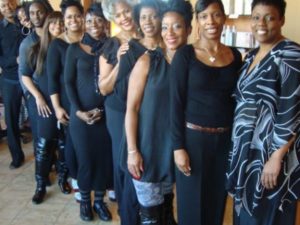
Cynthia Johnson (center) with D’Lor Salon and Spa staff.
“We consult with our customers, we advise them on what to get, we ask questions,” Johnson told Atlanta Black Star. “It’s about education and the experience we create for our customers in a beautiful environment.”
The education doesn’t stop with consumers, however. Johnson encourages Black business owners, as well as those just starting out in the Black hair industry, to continue educating themselves on the ins and outs of the business. Her other suggestions included coming together, partnering with other African-American entrepreneurs and learning from one another.
“In numbers we are powerful,” she said. “We can accomplish a lot together.”
Lastly, Johnson asserted that the major key in gaining control of the Black hair industry lies in teaching budding African-American entrepreneurs the value of a dollar and how to handle it.

